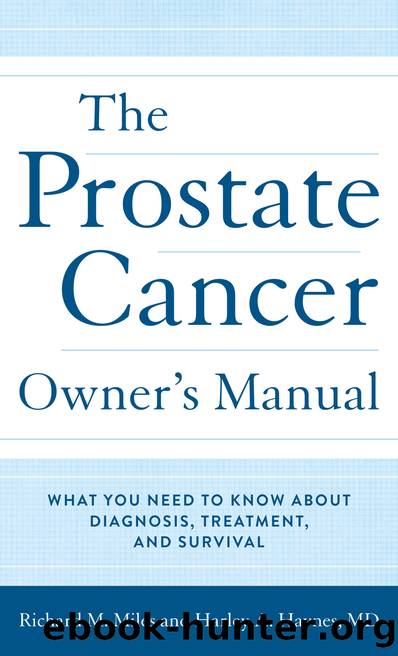The Prostate Cancer Owner's Manual: What You Need to Know About Diagnosis, Treatment, and Survival by Md Harley Haynes & Richard M. Miles

Author:Md Harley Haynes & Richard M. Miles [Haynes, Md Harley & Miles, Richard M.]
Language: eng
Format: epub
Tags: Health & Fitness, healing, Men's Health, diseases, Cancer
ISBN: 9781538153321
Google: fKQfzgEACAAJ
Publisher: Rowman & Littlefield Publishers
Published: 2021-11-15T23:45:48.660916+00:00
THE VERY PERSONAL SIDE OF INTIMACY
A truism accepted by most prostate cancer recovery professionals is that real intimacy goes well beyond sexual intercourse; it is a mental connection, an almost intuitive ability to communicate with another person. This unique closeness is often enhanced as one approaches the final days and can be aided by effective and thoughtful palliative care.
The following commentary, entitled âAt Lifeâs End, The Gift Of Intimacy,â aired on May 14, 2019, on Bostonâs WBUR-FM on the regular program called Cognoscenti.6 It was presented by Dr. Ashwini C. Bapata, a palliative care physician at Bostonâs Massachusetts General Hospital and a Harvard Medical School instructor.
I met Charles, a self-proclaimed foodie, while he was being treated for esophageal cancer. The tumor had narrowed his esophagus, making it hard to enjoy his chipotle-rubbed steaks. He had lost 30 pounds in a few months and had constant throat pain and nausea.
As his palliative care doctor, I helped make his pain and nausea tolerableâ¦. Unfortunately, his cancer progressed despite aggressive treatment. He no longer had the strength to work or drive. He stopped gardening because he didnât have the stamina to kneel, dig and sow seeds. His hikes through the woods became traipses around the house with a walker.
I often ask my patients with life-threatening illness to define their goals. What would be most important to them if time were short? Charlesâs answer was emphatic.
âI donât want to be a burden to my wife,â he said. âIf I canât eat or poop or get out of bed, use the morphine drip. Let me go.â Many patients tell me something very similar. Itâs as though the possibility of dependence is harder to cope with than the possibility of dying.
As the cancer spread, it limited Charles to eating only pureed food. Then he needed a commode placed next to his bed. Eventually, he was completely bedridden and very thin, barely a lump under the covers. One day, during a home visit, I stood at the bedroom threshold, watching his wife Ellen grab a diaper, slide it under the soiled one, clean Charles with wet wipes. She chucked the soiled diaper in the trash and combed her fingertips through his wispy hair. This was exactly what Charles didnât wantâlingering like an unwanted guest in his own home.
As a palliative care doctor, I have learned it is the lucky few who drive themselves to work one day, and then die peacefully in their sleep that night. For most people, dying is some version of Charlesâ experience. For some cancer patients, like Charles, the change is rapid.
During the home visit, Ellen pulled me aside and shared her struggles. She had not been sleeping. She drifted in the shallows of sleep, surfacing frequently to scan the baby monitor for moaning or grimacing, signs that Charles needed more pain medications. During the two hours each day when the home health aide watched Charles, she rushed from the grocery store to the pharmacy and then to the bank, before speeding home to ward off an impending crisis.
Download
This site does not store any files on its server. We only index and link to content provided by other sites. Please contact the content providers to delete copyright contents if any and email us, we'll remove relevant links or contents immediately.
Spare by Prince Harry The Duke of Sussex(5171)
Machine Learning at Scale with H2O by Gregory Keys | David Whiting(4287)
Fairy Tale by Stephen King(3361)
Will by Will Smith(2894)
The Bullet Journal Method by Ryder Carroll(2555)
Hooked: A Dark, Contemporary Romance (Never After Series) by Emily McIntire(2538)
Rationality by Steven Pinker(2345)
It Starts With Us (It Ends with Us #2) by Colleen Hoover(2321)
Can't Hurt Me: Master Your Mind and Defy the Odds - Clean Edition by David Goggins(2316)
Friends, Lovers, and the Big Terrible Thing by Matthew Perry(2210)
The Becoming by Nora Roberts(2181)
Love on the Brain by Ali Hazelwood(2050)
The Strength In Our Scars by Bianca Sparacino(1833)
HBR's 10 Must Reads 2022 by Harvard Business Review(1831)
A Short History of War by Jeremy Black(1829)
Leviathan Falls (The Expanse Book 9) by James S. A. Corey(1723)
A Game of Thrones (The Illustrated Edition) by George R. R. Martin(1702)
515945210 by Unknown(1659)
Bewilderment by Richard Powers(1604)
